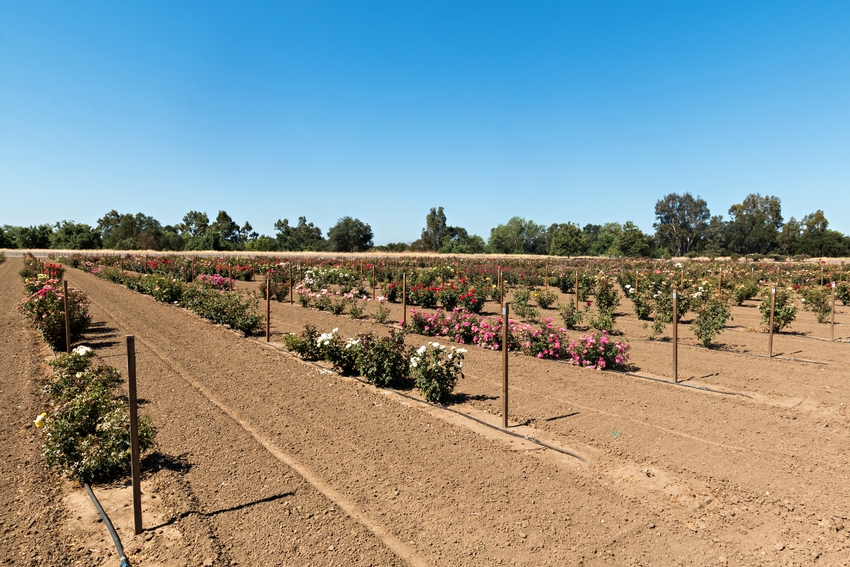
FPS Rose Introduction Services
Custom testing and disease elimination services are available through execution of a custom Service Agreement with the University. To initiate this service, please contact FPS at:
E-mail at [email protected].
Cost for Services
Testing and Treatment: Complete disease testing panel and concurrent disease elimination therapy by micro-shoot-tip tissue culture or heat therapy (including pre- and post-therapy testing panels) to qualify foreign and domestic selections for release from federal quarantine and/or inclusion in the FPS virus indexed blocks. Timeline for this service is approximately 2-8 years.
| Testing & Treatment: | $3,000.00 per public selection* $5,000.00 per proprietary selection |
| Planting in Foundation collection: | $650 per proprietary selection |
| Maintenance in Foundation collection: | $200 per year per proprietary selection |
Custom testing and disease elimination services are available through execution of a custom Service Agreement with the University. To initiate this service, please contact FPS at:
E-mail at [email protected]
Obtain permission to propagate source materials in the USA
According to the service agreement between the customer and FPS, the customer (not FPS) is responsible for obtaining permission to propagate all rose materials submitted for custom services. It is a good idea to have a written record of this permission. The FPS service agreement states that "The Customer hereby represents and warrants that it has legal title to, and has the right to propagate the Selection(s) submitted for custom services."
Verification that material is sourced from a site in which Rose rosette virus has not been identified.
Rose Rosette Disease (RRD) is caused by the negative-sense RNA virus, rose rosette virus (RRV), which is vectored by the eriophyid mite (Phyllocoptes fructiphilus Keifer). Some of the more recognizable symptoms include rapid elongation of new shoots followed by development of witches' brooms or clustering of small branches. Leaves in the witches' broom are small and distorted. Canes on some species or cultivars develop excessive growth of unusually soft and pliable red or green thorns that may stiffen later.
For more information, please visit: https://roserosette.org/
Recently, RRV was detected from two rose plants at a commercial nursery in Wasco as well as three garden roses planted in two neighboring homes in Bakersfield, California. To our knowledge, this is the first report of Rose rosette virus associated with rose rosette disease affecting roses in California. Information from the American Phytopathological Society can be found at https://apsjournals.apsnet.org/doi/10.1094/PDIS-07-18-1203-PDN.
Based on these findings, FPS is taking all necessary measures to reduce the risk of introducing RRV to the FPS collections. FPS is not accepting introduction of material from sources in which RRD is known to occur.
Submitting Plant Material
The preferred method for introducing rose selections is as bare root plants between December and March.
As Liners or Bare Root Plants:
Please submit two plants, ideally propagated from a single source plant. Plants must be labeled with variety name, and source information. Please also indicate whether the plants are own rooted or grafted to rootstock.
As Cuttings:
Please collect 25-30 fresh, hardwood cuttings from a single source plant for each variety/selection to be supplied. The optimum size for the cuttings is 9"-12" (22-30 cm) long and 1/4" to 1/2" (6-12 mm) in diameter. If you are unable to supply the optimum number and size of cuttings, please send all of the cuttings of all sizes that can be collected from a single source plant for each variety/selection. Please note that, if you are unable to send the requested number or size of cuttings, the treatment/testing period may be significantly extended to prepare the additional needed propagations for pathogen testing purposes. Cuttings from a single source plant must be bundled and labeled with variety name, and source information. The cuttings should be enclosed in a sealed plastic bag with a very small amount of moisture, packed in a rigid cardboard box or tube, and kept in cold storage until the day of shipment.
Prices and information as of 07-Feb-26




